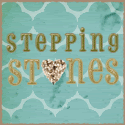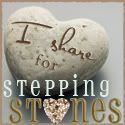“The moment a child is (conceived and) born,
the mother is also (conceived and) born.
She never existed before.
The woman existed, but the mother, never.
A mother is something absolutely new.”
Bhagwan Shree Rajneesh
(Indian Spiritual leader, 1931-1990)
I added the (conceived and)
The moment you find out you are pregnant you start loving and making plans for your child. You ARE a mom- I'm so sorry you child is not with you today.
I'm wishing all of you a gentle and peaceful Mother's Day
peace-
emily
Friday, May 7, 2010
True History of Mother's Day
I'm lifting this from Kara Jones post over at FaveCraftsBlog- to read her whole post click here. And if you have a few minutes, visit Kara's blogs MotherHenna.com and Kota:Knowing Ourselves Through Art

...They were handing out fliers sharing the writing of Julia Ward Howe, first published in 1870 as a protest against the carnage and violence of the Civil War. This was a protest led by women whose sons had died! Bereaved mothers started this tradition of Mothers Day! In the beginning, this was a day of protest, an expression of horrified grief from bereaved mothers who were parted from their sons!! Wow. Okay. That’s a different spin.
So what did Julia have to say back in 1870? You read and see for yourself:
Arise, then, women of this day! Arise all women who have hearts, whether our baptism be that of water or of fears!
Say firmly: “We will not have great questions decided by irrelevant agencies. Our husbands shall not come to us, reeking with carnage, for caresses and applause. Our sons shall not be taken from us to unlearn all that we have been able to teach them of charity, mercy and patience.
We women of one country will be too tender of those of another country to allow our sons to be trained to injure theirs. From the bosom of the devastated earth a voice goes up with our own. It says “Disarm, Disarm! The sword of murder is not the balance of justice.”
Blood does not wipe our dishonor nor violence indicate possession. As men have often forsaken the plow and the anvil at the summons of war, let women now leave all that may be left of home for a great and earnest day of counsel. Let them meet first, as women, to bewail and commemorate the dead.
Let them then solemnly take counsel with each other as to the means whereby the great human family can live in peace, each bearing after their own time the sacred impress, not of Caesar, but of God.
In the name of womanhood and of humanity, I earnestly ask that a general congress of women without limit of nationality may be appointed and held at some place deemed most convenient and at the earliest period consistent with its objects, to promote the alliance of the different nationalities, the amicable settlement of international questions, the great and general interests of peace.
Julia Ward Howe
Boston
1870
Mothers Day came as an answer to Julia’s proclamation. It started as a ceremony of bereavement and then as a movement for peace and action to stop the senseless deaths of children everywhere. Our society can commercialize all they want. Because in my heart of hearts I know the real meaning of this day came from pain, loss, and grief — the same things I am prone to feel on any given Mothers Day. And from now on, when people urge me to celebrate the day, I tell them this:
I’ll celebrate with you if you will first mourn with me. It is the combination of the two that lends itself to the true meaning of Mothers Day!

...They were handing out fliers sharing the writing of Julia Ward Howe, first published in 1870 as a protest against the carnage and violence of the Civil War. This was a protest led by women whose sons had died! Bereaved mothers started this tradition of Mothers Day! In the beginning, this was a day of protest, an expression of horrified grief from bereaved mothers who were parted from their sons!! Wow. Okay. That’s a different spin.
So what did Julia have to say back in 1870? You read and see for yourself:
Arise, then, women of this day! Arise all women who have hearts, whether our baptism be that of water or of fears!
Say firmly: “We will not have great questions decided by irrelevant agencies. Our husbands shall not come to us, reeking with carnage, for caresses and applause. Our sons shall not be taken from us to unlearn all that we have been able to teach them of charity, mercy and patience.
We women of one country will be too tender of those of another country to allow our sons to be trained to injure theirs. From the bosom of the devastated earth a voice goes up with our own. It says “Disarm, Disarm! The sword of murder is not the balance of justice.”
Blood does not wipe our dishonor nor violence indicate possession. As men have often forsaken the plow and the anvil at the summons of war, let women now leave all that may be left of home for a great and earnest day of counsel. Let them meet first, as women, to bewail and commemorate the dead.
Let them then solemnly take counsel with each other as to the means whereby the great human family can live in peace, each bearing after their own time the sacred impress, not of Caesar, but of God.
In the name of womanhood and of humanity, I earnestly ask that a general congress of women without limit of nationality may be appointed and held at some place deemed most convenient and at the earliest period consistent with its objects, to promote the alliance of the different nationalities, the amicable settlement of international questions, the great and general interests of peace.
Julia Ward Howe
Boston
1870
Mothers Day came as an answer to Julia’s proclamation. It started as a ceremony of bereavement and then as a movement for peace and action to stop the senseless deaths of children everywhere. Our society can commercialize all they want. Because in my heart of hearts I know the real meaning of this day came from pain, loss, and grief — the same things I am prone to feel on any given Mothers Day. And from now on, when people urge me to celebrate the day, I tell them this:
I’ll celebrate with you if you will first mourn with me. It is the combination of the two that lends itself to the true meaning of Mothers Day!
Saturday, May 1, 2010
Shakespeare's Hamnet
I found out something interesting. Did you know Shakespeare had a son, Hamnet, who died at age 11? Shakespeare had been writing comedies, but switched to writing his great tragedies in the years following his son's death. Within a few years, he wrote Hamlet. Really adds a whole new twist to the 'To be, or not to be' speech, doesn't it?
To be, or not to be: that is the question:
Whether 'tis nobler in the mind to suffer
The slings and arrows of outrageous fortune,
Or to take arms against a sea of troubles,
And by opposing end them? To die: to sleep;
No more; and by a sleep to say we end
The heart-ache and the thousand natural shocks
That flesh is heir to, 'tis a consummation
Devoutly to be wish'd. To die, to sleep;
To sleep: perchance to dream: ay, there's the rub;
For in that sleep of death what dreams may come
When we have shuffled off this mortal coil,
Must give us pause: there's the respect
That makes calamity of so long life;
For who would bear the whips and scorns of time,
The oppressor's wrong, the proud man's contumely,
The pangs of despised love, the law's delay,
The insolence of office and the spurns
That patient merit of the unworthy takes,
When he himself might his quietus make
With a bare bodkin? who would fardels bear,
To grunt and sweat under a weary life,
But that the dread of something after death,
The undiscover'd country from whose bourn
No traveller returns, puzzles the will
And makes us rather bear those ills we have
Than fly to others that we know not of?
Thus conscience does make cowards of us all;
And thus the native hue of resolution
Is sicklied o'er with the pale cast of thought,
And enterprises of great pith and moment
With this regard their currents turn awry,
And lose the name of action. - Soft you now!
The fair Ophelia! Nymph, in thy orisons
Be all my sins remember'd.
and, from King Lear, where he recognizes his daughter is dead:
No, no, no life!
Why should a dog, a horse, a rat, have life,
And thou no breath at all? Thou'lt come no more,
Never, never, never, never, never!
To be, or not to be: that is the question:
Whether 'tis nobler in the mind to suffer
The slings and arrows of outrageous fortune,
Or to take arms against a sea of troubles,
And by opposing end them? To die: to sleep;
No more; and by a sleep to say we end
The heart-ache and the thousand natural shocks
That flesh is heir to, 'tis a consummation
Devoutly to be wish'd. To die, to sleep;
To sleep: perchance to dream: ay, there's the rub;
For in that sleep of death what dreams may come
When we have shuffled off this mortal coil,
Must give us pause: there's the respect
That makes calamity of so long life;
For who would bear the whips and scorns of time,
The oppressor's wrong, the proud man's contumely,
The pangs of despised love, the law's delay,
The insolence of office and the spurns
That patient merit of the unworthy takes,
When he himself might his quietus make
With a bare bodkin? who would fardels bear,
To grunt and sweat under a weary life,
But that the dread of something after death,
The undiscover'd country from whose bourn
No traveller returns, puzzles the will
And makes us rather bear those ills we have
Than fly to others that we know not of?
Thus conscience does make cowards of us all;
And thus the native hue of resolution
Is sicklied o'er with the pale cast of thought,
And enterprises of great pith and moment
With this regard their currents turn awry,
And lose the name of action. - Soft you now!
The fair Ophelia! Nymph, in thy orisons
Be all my sins remember'd.
and, from King Lear, where he recognizes his daughter is dead:
No, no, no life!
Why should a dog, a horse, a rat, have life,
And thou no breath at all? Thou'lt come no more,
Never, never, never, never, never!
Labels:
celebrity loss
Subscribe to:
Comments (Atom)










